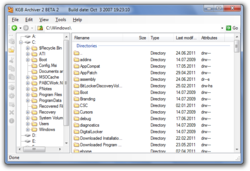| KGB Archiver | |
|---|---|
 Screenshot of KGB Archiver 2.0 beta 2 | |
| Developer | Tomasz Pawlak |
| Initial release | April 2006 |
| Repository | KGB Archiver Repository |
| Written in | Visual C++ |
| Operating system | Windows, Unix-like |
| Available in | English, Arabic, Czech, German, Greek, Japanese, Polish, Portuguese, Serbian, Spanish, and Ukrainian [1] |
| Type | File archiver |
| License | GPL-2.0-only |
KGB Archiver is a discontinued file archiver and data compression utility that employs the PAQ6 compression algorithm. [2] Written in Visual C++ by Tomasz Pawlak, KGB Archiver is designed to achieve a very high compression ratio. It has ten levels of compression, from very weak to maximum. However, at higher compression levels, the time required to compress a file increases significantly. [3] As a consequence, the program uses memory and CPU intensively.
Contents
KGB Archiver is free and open-source, released under the terms of the GNU General Public License. Version 2 beta 2 is available for Microsoft Windows [3] [2] and a command-line version of KGB Archiver 1.0 is available for Unix-like operating systems.